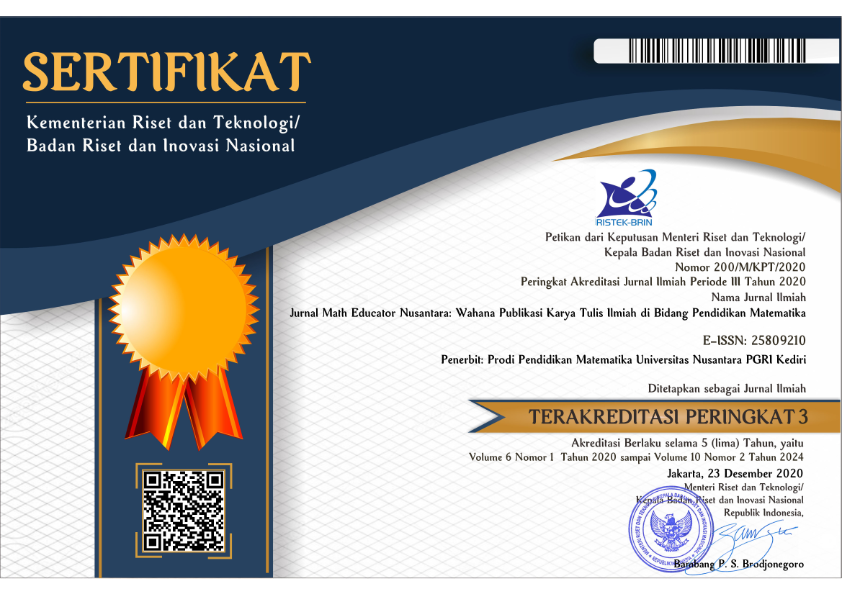THE EXISTENCE OF STUDENTS IN TRANS EXTENDED COGNITIVE DEVELOPMENT ON LEARNING OF GRAPH THEORY*)
DOI:
https://doi.org/10.29407/jmen.v1i1.119Abstract
The results of previour research Wahyu (2001-2009), found the reinforce and complement the theory of Cognitive Development (Scheme) student (Extended Level Triad++) in the learning of mathematics. The purposes of the study are: 1) to generate a new theory about the Extended Level Triad++ ie levels of development schemes student to Graph Theory finer (from five levels to seven levels); 2) to determine the characteristics of the new levels of the triad (the Triad Level Extended++). In the qualitative research, data were collected from a task-based interview, then performed the data reduction, and presentation of data, as well as the next steps as set out in the flowchart prosesur collection and analysis of data, the data analysis will apply genetic decomposition analysis. Then to get a characterization of each level of the development carried out by the method-comparison analysis-fixed, by applying the theory of Glaser & Strauss, a theorizing process through four stages. The results of this study obtained in the form of advanced theory Extended Level Triad++. The theory is then summarized in a network schema development consisting of seven levels, ie the level of pre-intra, intra, semi-inter-level, international level, the level of semi-trans, trans level, and the level of extended- trans.
Keywords: Extended Trans, Development Scheme, Triad Level
Downloads
Published
Issue
Section
License
Authors who publish with this journal agree to the following terms:
- Copyright on any article is retained by the author(s).
- The author grants the journal, the right of first publication with the work simultaneously licensed under a Creative Commons Attribution License that allows others to share the work with an acknowledgment of the work’s authorship and initial publication in this journal.
- Authors are able to enter into separate, additional contractual arrangements for the non-exclusive distribution of the journal’s published version of the work (e.g., post it to an institutional repository or publish it in a book), with an acknowledgment of its initial publication in this journal.
- Authors are permitted and encouraged to post their work online (e.g., in institutional repositories or on their website) prior to and during the submission process, as it can lead to productive exchanges, as well as earlier and greater citation of published work.
- The article and any associated published material is distributed under the Creative Commons Attribution-ShareAlike 4.0 International License














